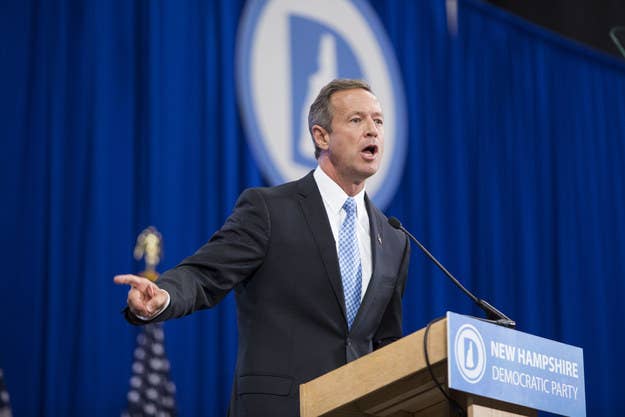
MANCHESTER, N.H. — About two months ago, former Maryland Gov. Martin O'Malley made it the mission of his presidential campaign to start a debate over the debates.
He spent the summer calling for more debates, and calling on others to call for more debates. He printed new campaign signs with a debate slogan ("We Need Debate"), joined a debate protest outside the Democratic National Committee headquarters in Washington, and accused the party chair of autocratically devising a "rigged" debate system that would benefit Hillary Clinton.
On Saturday, at the New Hampshire Democratic Party convention, O'Malley witnessed one of his biggest victories yet: Dozens of attendees rallied the hall into boos and chants for more debates during a speech by the DNC chair, Rep. Debbie Wasserman-Schultz. "C'mon, folks. We're all on the same side," she said over the noise.
But when it was his turn to take the podium, O'Malley did not talk about the Democratic debates, or the "We Need Debate" campaign, or the supporters who helped interrupt Wasserman-Schultz earlier in the day. He gave his standard speech, hitting on his record as governor of Maryland, his 15 "strategic goals to rebuild the American Dream" — and only alluded to the issue with a few passing references to the "unanswered" Republican debates.
Afterward, reporters wanted to know: Where was the victory lap!
"Local democrats and media members were wondering," one asked, "why not make that more of a focal point with the crowd being obviously be so into that message?"
O'Malley, still polling in the low single-digits, appeared eager to remind his questioner that his campaign is not, in fact, a campaign for more Democratic debates. It is a campaign for president.
"The theme of my campaign is not about process. It's about the actions that we need to take to help rebuild the American dream, and make wages go up rather than down," O'Malley said, standing with a few aides backstage at the Verizon Wireless Arena in Manchester. "And so that's what I focus on wherever I speak. When I jump up on a chair I often will mention that we should be having more debates rather than fewer."
The scene at the convention, where five of the six Democratic candidates spoke after Wasserman-Schultz, signaled both the success of O'Malley's debate over the debates, and the challenge that now poses to his candidacy, having made a matter of "process" such a prominent part of his campaign message.
On Saturday, O'Malley recognized that the debate question will come and go: Wasserman-Schultz, under added pressure from statements against the setup by Nancy Pelosi and the DNC's two vice chairs, will either add to the six scheduled debates, or she will not. Then, the debates will happen. The first one is next month.
O'Malley, as he put it backstage, plans to keep talking about the questions that comprise the center of his campaign — questions, he said, that do not involve debates.
"The center of my campaign is not about a process. It's about a country. Our country. And what we need to do to create a better life for our kids," he said.
As for why he didn't highlight the debates in his speech on Saturday, O'Malley noted that the convention marked the first time the candidates appeared at the same event in New Hampshire. (Clinton spoke first, followed by O'Malley; Bernie Sanders, the senator from Vermont; Lincoln Chafee, the former governor and senator from Rhode Island; and Lawrence Lessig, the Harvard Law professor. Jim Webb, another Democratic candidate, did not attend.)
"The issue of having more debates is certainly an important one," O'Malley said. "And certainly the crowd made their opinion known when the chair spoke."
O'Malley's campaign zeroed in on the debate issue in August, when the DNC released a slate of dates and locations for six debates. Under the current plan, four come before the caucuses and primaries begin — including one debate in Iowa, home to the first caucuses, and one debate in New Hampshire, home to the first primary. In 2008, as his campaign has pointed out, Democrats held two debates in Iowa before the caucuses, and three in New Hampshire before the primary.
O'Malley argued that the schedule unfairly benefited Clinton, who, at the time, still led Sanders in early-state polling. His campaign's lawyer has also questioned the legality of the DNC's so-called "exclusivity clause," which bars candidates from participating in unsanctioned non-party debates.
At a DNC meeting last month, with Wasserman-Schultz seated on stage just paces away, O'Malley delivered a speech largely dedicated to attacking the schedule. While the Republicans criticize Democrats at their own debates, O'Malley said, "we respond… with crickets, tumbleweeds, a cynical move to delay and limit our own party debates."
"This is totally unprecedented in our party history," he said. "This sort of rigged process this has never been attempted before."
Sanders has since joined O'Malley's effort. And Clinton, who for weeks declined to engage much at all with the issue when asked, said earlier this month that she would be open to more debates. "I have made it clear that if they want to do more, I'm happy to do them," Clinton said during an appearance on CNN this week.
On Saturday, speaking with reporters after his speech, O'Malley argued that the party, and all its candidates, would suffer for every Republican debate without a Democratic counterpart. "Wy would you turn over the microphone?" he said. "I think most Democrats are pretty upset by it, and the DNC members themselves were never even consulted. This was a one-woman edict."
And what about his campaign, a reporter asked. How was he going to get his numbers up?
"You got to keep going," O'Malley replied.
